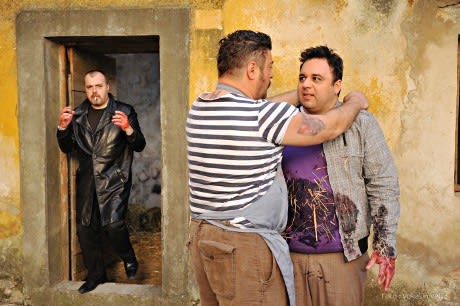Taking a page from the book of Almodovar, Serbian director Srdjan Dragojevic's latest socio-political analysis, The Parade, makes campy and comic the depressing and horrific. Though more like the American film, Relax...It's Just Sex, than anything specific to the Award-winning Spanish director's early work, the tone is there, just as the "small world" kitschy convenience of interconnected hyper-realized character types hints at telenovella influence .
It's a weirdly appropriate—deliberately tacky—approach for Dragojevic, seeing as The Parade refers to an attempted gay pride parade in post-war Serbia, where kidnappings and war criminal fallout continues to this day. With such animosity between neighbouring nations of Croatia and Bosnia, the sheer scope of trying to normalize homosexuality is, in itself, darkly comic, which is acknowledged in the opening title card sequence where the various slurs are explained for referencing purposes.
Rather than acknowledge the irony of the Serbians—notoriously the most brutal offenders during the Bosnian war—bringing together different people to embrace a gay pride parade, Dragojevic dives into twisted camp comedy with the shooting of war criminal turned securities manager, Limun's (Nikola Kojo), dog. Threatening the life of effete veterinarian Radmilo (Milos Samolov) while trying to save the dog, he learns that his fiancée's (Hristina Popovic) wedding planner Mirko (Goran Jevtic) is the vet's life partner.
Through a complicated series of deliberate unlikelihoods, the homophobic Limun is blackmailed into offering security and protection for an upcoming gay pride parade from the anticipated thousands of gay-bashers. Even more unlikely and fantastical is the recruitment of his fellow war buddies from Bosnia and Croatia for the event.
With knowing nods to homosexual subtext in Ben Hur, Limun's favourite film, the manic tone and sick comedy—Biserka (Popovic) delivers a monologue about the good nature of her fiancé while Mirko lays on the ground bleeding from the head—propel the story forward rapidly, leaving little time to question the logistics of things like two gay men driving a pink car in Serbia. Nothing about The Parade resembles much from reality until the final moments when the harshness of the world eventually bursts the madcap bubble.
Making light of such atrocities is quite risky and could easily be disastrous, but there's an idealistic, sincere glimmer behind it all that makes it work. Even when burly war criminals are blurting out horrifying things about needing to avoid blood when bashing gays, there's a knowing smirk and consistency in voice that makes it weirdly palatable.
Still, some oversimplifications in politics and obvious unfunny jokes make The Parade less than amazing fare. But the sheer ambition and intention alone is something to celebrate.
(Global Film Initiative)It's a weirdly appropriate—deliberately tacky—approach for Dragojevic, seeing as The Parade refers to an attempted gay pride parade in post-war Serbia, where kidnappings and war criminal fallout continues to this day. With such animosity between neighbouring nations of Croatia and Bosnia, the sheer scope of trying to normalize homosexuality is, in itself, darkly comic, which is acknowledged in the opening title card sequence where the various slurs are explained for referencing purposes.
Rather than acknowledge the irony of the Serbians—notoriously the most brutal offenders during the Bosnian war—bringing together different people to embrace a gay pride parade, Dragojevic dives into twisted camp comedy with the shooting of war criminal turned securities manager, Limun's (Nikola Kojo), dog. Threatening the life of effete veterinarian Radmilo (Milos Samolov) while trying to save the dog, he learns that his fiancée's (Hristina Popovic) wedding planner Mirko (Goran Jevtic) is the vet's life partner.
Through a complicated series of deliberate unlikelihoods, the homophobic Limun is blackmailed into offering security and protection for an upcoming gay pride parade from the anticipated thousands of gay-bashers. Even more unlikely and fantastical is the recruitment of his fellow war buddies from Bosnia and Croatia for the event.
With knowing nods to homosexual subtext in Ben Hur, Limun's favourite film, the manic tone and sick comedy—Biserka (Popovic) delivers a monologue about the good nature of her fiancé while Mirko lays on the ground bleeding from the head—propel the story forward rapidly, leaving little time to question the logistics of things like two gay men driving a pink car in Serbia. Nothing about The Parade resembles much from reality until the final moments when the harshness of the world eventually bursts the madcap bubble.
Making light of such atrocities is quite risky and could easily be disastrous, but there's an idealistic, sincere glimmer behind it all that makes it work. Even when burly war criminals are blurting out horrifying things about needing to avoid blood when bashing gays, there's a knowing smirk and consistency in voice that makes it weirdly palatable.
Still, some oversimplifications in politics and obvious unfunny jokes make The Parade less than amazing fare. But the sheer ambition and intention alone is something to celebrate.




